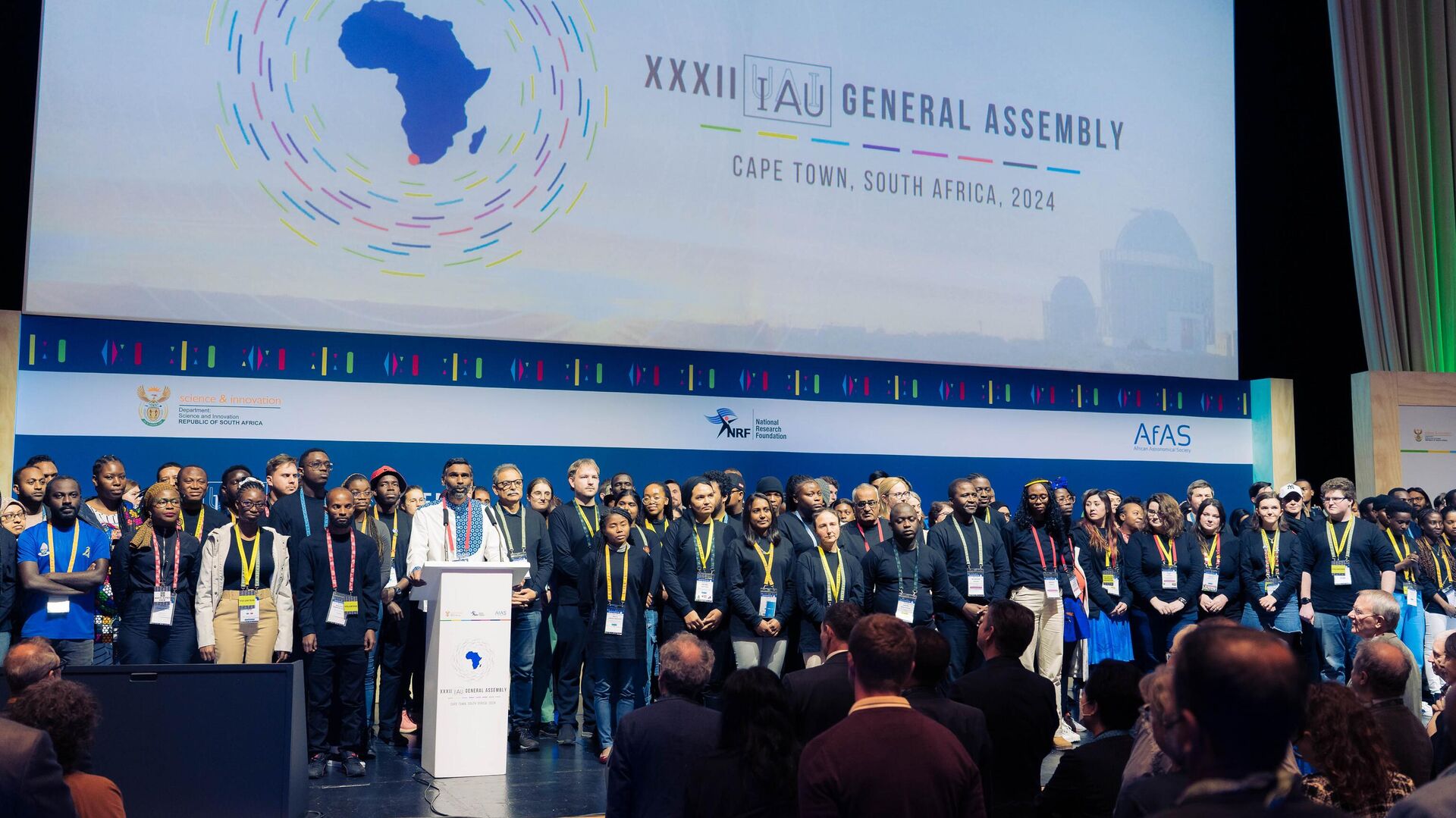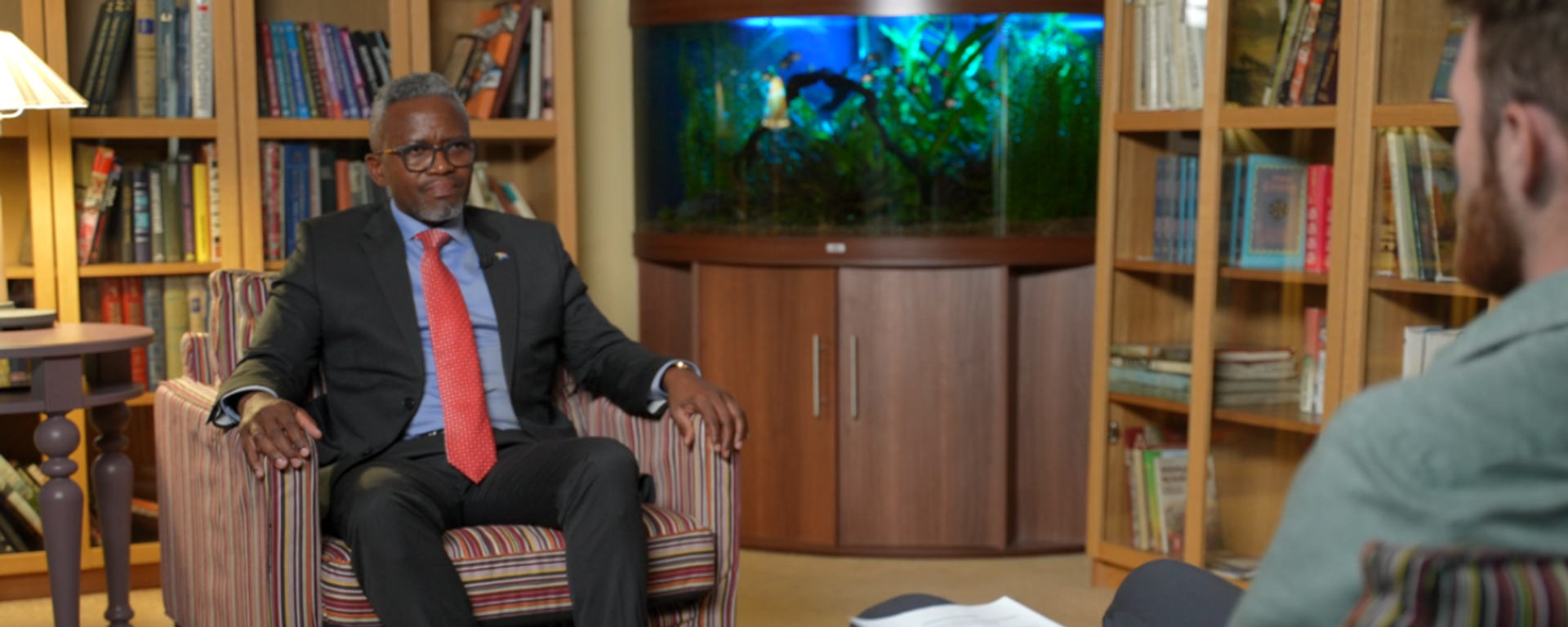https://en.sputniknews.africa/20240820/stars--beyond-sa-minister-on-outcomes-of-multifaceted-iau-meeting-and-potential-benefits-ahead-1067937260.html
Stars & Beyond: SA Minister on Outcomes of 'Multifaceted' IAU Meeting and Potential Benefits Ahead
Stars & Beyond: SA Minister on Outcomes of 'Multifaceted' IAU Meeting and Potential Benefits Ahead
Sputnik Africa
The XXXII General Assembly of the International Astronomical Union (IAU) was held from August 6 to 15 for the first time in Africa, namely in Cape Town, South... 20.08.2024, Sputnik Africa
2024-08-20T19:12+0200
2024-08-20T19:12+0200
2024-08-20T19:24+0200
opinion
africa in details
cape town
south africa
sputnik africa
brics
astronomy
space exploration
research
brics summit 2024
https://cdn1.img.sputniknews.africa/img/07e8/08/14/1067939215_0:161:3071:1888_1920x0_80_0_0_96ce1cf45dccad536f11928841c37847.jpg
The legacy of the IAU General Assembly is multifaceted, with many participants highlighting their newfound awareness of the extensive astronomical research and work being conducted in Africa, which itself will leave a very positive impact, Professor Bonginkosi Emmanuel Blade Nzimande, South Africa’s Minister of Science, Technology, and Innovation, told Sputnik Africa.Speaking about other results of the assembly, the minister was pleased to announce that his country has "signed two very important agreements." The first memorandum of understanding was signed between the Square Kilometer Array (SKA) Observatory and the African Astronomical Society, focusing on the advancement of radio astronomy and the necessary skills in Africa.Similarly, the second memorandum, signed between the SKA and the South African Radio Astronomy Observatory, aims to collaborate on the development of radio astronomy and essential skills within the continent.The professor remarked that the event provided an excellent platform for showcasing African astronomy to the global community, adding that this will significantly enhance Africa's reputation as a leading destination for high-tech astronomy sciences and facilities. Additionally, he highlighted that, for the first time, 30% of the participants at the IAU were delegates from Africa, marking the highest attendance by African countries in the IAU's over-century-long history. This clearly demonstrates the growing enthusiasm among African nations, according to Nzimande.Sputnik Africa also discussed international space exploration efforts. The speaker pointed out that the SKA is a global initiative, involving countries from Europe, Asia, and other continents, including Africa, with partners from Africa playing a very active role in the development of the SKA, as the minister underscored.Moreover, BRICS serves as another significant international partner. For instance, the 10th BRICS Astronomy Working Group Workshop will be held in Kazan, Russia, from September 9-13. The official highlighted that the IAU General Assembly's recent convening in South Africa, a BRICS member, will further contribute to the BRICS community. Nzimande highlighted that BRICS also sponsors various initiatives that, among other benefits, support the involvement of young researchers.Regarding the upcoming workshop in Kazan, the minister recalled the significant bilateral discussions held between South Africa and the Russian Minister of Science. Both countries acknowledged the need to advance this collaboration, particularly in the field of space science. They agreed to explore opportunities for joint research, satellite launches, and broader cooperation in space endeavors.In the conclusion of the interview, Nzimande emphasized that the burgeoning collaboration in space science between the two nations is firmly based upon an already robust foundation.
https://en.sputniknews.africa/20240527/ceo-of-sa-national-space-agency-praises-brics-space-project-explains-how-africa-can-benefit-from-it-1066767129.html
cape town
south africa
russia
space
Sputnik Africa
feedback@sputniknews.com
+74956456601
MIA „Rossiya Segodnya“
2024
Christina Glazkova
https://cdn1.img.sputniknews.africa/img/07e7/0b/07/1063380906_0:0:673:674_100x100_80_0_0_79628b4d0cd9f29291a57aa13bbf9e7a.jpg
Christina Glazkova
https://cdn1.img.sputniknews.africa/img/07e7/0b/07/1063380906_0:0:673:674_100x100_80_0_0_79628b4d0cd9f29291a57aa13bbf9e7a.jpg
News
en_EN
Sputnik Africa
feedback@sputniknews.com
+74956456601
MIA „Rossiya Segodnya“
Sputnik Africa
feedback@sputniknews.com
+74956456601
MIA „Rossiya Segodnya“
Christina Glazkova
https://cdn1.img.sputniknews.africa/img/07e7/0b/07/1063380906_0:0:673:674_100x100_80_0_0_79628b4d0cd9f29291a57aa13bbf9e7a.jpg
africa in details, cape town, south africa, sputnik africa, brics, astronomy, space exploration, research, brics summit 2024, brics summit, russia, starship, space, spacecraft
africa in details, cape town, south africa, sputnik africa, brics, astronomy, space exploration, research, brics summit 2024, brics summit, russia, starship, space, spacecraft
Stars & Beyond: SA Minister on Outcomes of 'Multifaceted' IAU Meeting and Potential Benefits Ahead
19:12 20.08.2024 (Updated: 19:24 20.08.2024) Christina Glazkova
Writer / Editor
Exclusive
The XXXII General Assembly of the International Astronomical Union (IAU) was held from August 6 to 15 for the first time in Africa, namely in Cape Town, South Africa. Sputnik Africa discussed the significance of this historic event with a very special guest.
The legacy of the IAU General Assembly is multifaceted, with many participants highlighting their newfound awareness of the extensive astronomical research and work being conducted in Africa, which itself will leave a very positive impact, Professor Bonginkosi Emmanuel Blade Nzimande, South Africa’s Minister of Science, Technology, and Innovation, told Sputnik Africa.
"We also use the IAU to link up with schools in the vicinity of Cape Town; in particular, some came to the convention center [...] [and] also other astronomers actually physically visited schools and gave talks. This, in fact, really excited a lot of youngsters and opened their eyes about astronomy. We think this will [...] generate the necessary curiosity that is needed in order to advance science. [...] We are also hoping to promote astro-tourism so that people can come from all over the world to [...] visit our astronomical facilities. [...] We also want to promote science tourism generally," he added.
Speaking about other results of the assembly, the minister was pleased to announce that his country has "signed two very important agreements." The first memorandum of understanding was signed between the Square Kilometer Array (SKA) Observatory and the African Astronomical Society, focusing on the advancement of radio astronomy and the necessary skills in Africa.
Similarly, the second memorandum, signed between the SKA and the South African
Radio Astronomy Observatory, aims to collaborate on the development of radio astronomy and essential skills within the continent.
"We are convinced that this will enhance collaboration inside the African continent in partnership with other global players," Nzimande stated.
The professor remarked that the event provided an excellent platform for showcasing African
astronomy to the global community, adding that this will significantly enhance Africa's reputation as a leading destination for high-tech astronomy sciences and facilities. Additionally, he highlighted that,
for the first time, 30% of the participants at the IAU were delegates from Africa, marking the highest attendance by African countries in the IAU's over-century-long history. This clearly demonstrates the growing enthusiasm among African nations, according to Nzimande.
Sputnik Africa also discussed international space exploration efforts. The speaker pointed out that the SKA is a global initiative, involving countries from Europe, Asia, and other continents, including Africa, with partners from Africa playing a very active role in the development of the SKA, as the minister underscored.
Moreover, BRICS serves as another significant international partner. For instance, the 10th BRICS Astronomy Working Group Workshop will be held in Kazan, Russia, from September 9-13. The official highlighted that the IAU General Assembly's recent convening in South Africa, a BRICS member, will further contribute to the BRICS community. Nzimande highlighted that BRICS also sponsors various initiatives that, among other benefits, support the involvement of
young researchers.Regarding the upcoming workshop in Kazan, the minister recalled the significant bilateral discussions held between South Africa and the Russian Minister of Science. Both countries acknowledged the need to advance this collaboration, particularly in the field of space science. They agreed to explore opportunities for joint research, satellite launches, and broader cooperation in space endeavors.
"That is why we are looking forward to participating in the BRICS meeting, which will be in Russia because we will also use that to actually meet with our Russian counterparts to take this discussion forward," he added.
In the conclusion of the interview, Nzimande emphasized that the burgeoning collaboration in
space science between the two nations is firmly based upon an already robust foundation.
"We are also going to be able to use the relationship with Russia to strengthen this broader Russia-Africa partnership in space and anchored initially around close collaboration between Russia and South Africa," the minister concluded.



